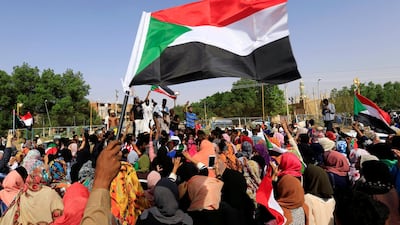A power-sharing deal between Sudan's military rulers and leaders of a protest movement has been hailed as a giant step towards restoring democracy in the large nation.
But analysts warn the challenges ahead are so formidable that the process could unravel before elections are held.
Brokered by the African Union and Ethiopia, the agreement broke an impasse from June 3, when talks between the two sides collapsed after security forces violently broke up a sit-in protest outside the armed forces headquarters in Khartoum.
The violence killed more than 100 protesters and wounded hundreds more.
The agreement, which stipulates a transitional period of three years and three months, came nearly three months after the military removed the country's ruler of 29 years, Omar Al Bashir, in a wave of deadly street protests against his rule.
The deal provides for a civilian-led government of technocrats and a sovereign council that will operate as a collective presidency, with five members each from the protest movement and the military.
An 11th member will be a civilian selected jointly by the two sides.
The council will be led by the military for the first 21 months and by a civilian representative for 18 months.
Also in the agreement is the launching of an independent and transparent investigation of all violent incidents starting from April 11 when the military removed Mr Al Bashir.
"It's the best possible deal at the moment but it only signals the start of a long and tortuous journey ahead," said Hany Raslan, a Sudan expert at Egypt's Al Ahram Centre for Political and Strategic Studies.
"But there remains a big question mark on whether it represents a real chance for a genuine and feasible settlement."
Mr Raslan said the main challenges included overhauling the country's crippled economy, resolving conflicts in areas west and south of Khartoum and purging state institutions of Bashir loyalists.
Looming over Sudan's future is the question of whether the military will implement the deal in good faith and step aside in 2022 to allow civilians to rule the country after elections.
It could prove a tall order given that generals have dominated the country's political landscape for most of the 63 years since independence in 1956.
And virtually all past democratically elected governments have proved ineffective or dysfunctional, prompting their overthrow by military coups in 1958, 1969 and 1989.
The economy is a formidable challenge that could derail the transitional period or cause popular frustration with the political process that follows.
Mr Al Bashir grossly mismanaged the economy during his 29 years in office, turning a blind eye to corrupt practices by his allies and focusing more on his political survival than the nation's interests.
It was under his watch that the southern region seceded in 2011, taking with it most of the country's oil wealth and plunging Sudan into what is possibly its worst economic crisis in decades.
To overhaul the economy, Sudan will need a huge infusion of foreign funds that is expected to chiefly come from Gulf countries.
They, in return, would want to see a serious and sustained effort by the government in Khartoum to dismantle the "deep state" left by Mr Al Bashir.
It is not clear just how committed the military is to purging Bashir loyalists from key areas such as the civil service, banking, health care and security forces.
A significant part of the armed forces, including members of the ruling military council, might feel the need to protect like-minded Sudanese to counter the weight of the mainly secular protest movement.
Rebellions in the west and south of Sudan, although largely dormant at the moment, could be another reason why the road ahead would be bumpy.
Already, rebel groups who have been fighting the Khartoum government for years have denounced Friday's transition agreement as ill-timed or a betrayal of the "revolution".
The agreement stipulates that the first six months of the transitional period be devoted to resolving rebellions in the western Darfur region and Nuba Mountains, and the Blue Nile region south of Khartoum.
Two rebel factions of the Sudan Liberation Movement, which is fighting government troops in Darfur, said on Saturday that a peace deal with guerrilla groups should have been reached before the power-sharing agreement.
A religiously and ethnically diverse country, rebellions over a bigger share of national resources or to end perceived discrimination have been the scourge of Sudan since independence.
The first rebellion in southern Sudan began in 1955 and lasted until 1972. Another began there in 1983 and lasted for two decades.
In Darfur, a rebellion in the early 2000s killed about 300,000 and displaced two million in a conflict that earned Mr Al Bashir and top aides an indictment by the International Criminal Court for genocide and crimes against humanity.
The rebellions in the Nuba Mountains and Blue Nile are more recent.
"Many of these groups want peace negotiations and the transition to democratic rule to go hand in hand," Mr Raslan said.


